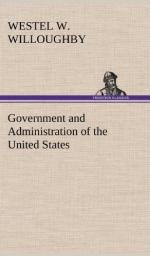(4). The determination of contract rights between individuals.
(5). The definition and punishment of crime.
(6). The administration of justice in civil causes.
(7). The determination
of the political duties, privileges, and
relations of citizens.
(8). Dealings of
the state with foreign powers; the preservation of
the state from external
danger or encroachment, and the advancement
of its intellectual
interests.
_#II. Optional or Ministrant Functions.#_
(1). The regulation of trade and industry. Under this head we must include the coinage of money, and the establishment of standard weights and measures, laws against forestalling, engrossing, the licensing of trades, etc., as well as the great matters of tariffs, navigation laws, and the like.
(2). The regulation of labor.
(3). The maintenance of thoroughfares, including state management of railways, and that great group of undertakings which we embrace within the comprehensive terms ‘Internal Improvements,’ or ’The Development of the Country.’
(4). The maintenance
of postal and telegraph systems, which is very
similar in principle
to (3).
(5). The manufacture
and distribution of gas, the maintenance of
water-works, &c.
(6). Sanitation,
including the regulation of trades for sanitary
purposes.
(7). Education.
(8). Care of the
poor and incapable. (9). Care and cultivation
of
forests and like matters,
such as stocking of rivers with fish.
(10). Sumptuary laws, such as ‘prohibition’ laws.
Under this second head have been included by no means all of the functions whose exercise by the government has been attempted or proposed, but they show the principal ones, and serve to indicate the nature of the optional field of governmental activity.
[Footnote 1: Wilson, The State, Section 1232.]
CHAPTER IV.
Colonial Governments; Their Relation to Each Other, and to England.
To understand clearly the early history of our country; to appreciate the reasons for the grievances of the colonists against their mother country; and to gain an intelligent idea of the events of that most critical period of our history, when the colonies, then free, were in doubt as to the nature of the federal government they should adopt; properly to understand all these facts, it is of essential importance that we should gain a correct knowledge of the condition of the colonies during those times, their relations to one another, their governmental connection with and attitude towards England.




